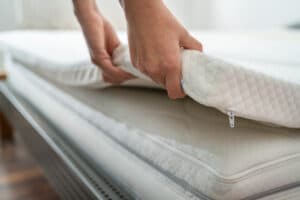Last Updated on January 18, 2023
A mattress can be an expensive investment, particularly when you’re spending on high-quality materials like memory foam. That means that it’s important to choose a memory foam mattress that can stand the test of time.
What is the average lifespan of a mattress? How long should a memory foam mattress last?
Though it’s hard to give a definitive answer to how long any foam mattress should last, most can be just as durable as spring beds, particularly when you know how to care for these products. Foam mattresses usually last for at least 7 years, according to the Sleep Council. However, there are ways to improve your bed life expectancy too.
How Long Do Mattresses Last?
This will depend on your circumstances. However, most experts agree that a mattress of any kind can usually last between 6 and 8 years.
Although, foam mattresses can easily degrade faster than this if you expose the foam to regular sources of moisture and heat that might harm the materials. It’s also worth noting that the lifespan of your foam mattress can depend on the kind of sleeper you are, your bed type, and whether you sleep alone or with a partner.
Now, how long does a memory foam mattress last? The comfort layers in memory foam mattresses can easily lose some of their bounce when exposed to heavier people. That’s why it’s best to get a special kind of mattress with thicker polyurethane foam at the core, depending on your weight.
In some cases, high-quality hybrid foam and innerspring mattresses, or a memory foam mattress with a special design to support your weight, can last longer than the average bed. Quality memory foam can last as long as 10 to 15 years when properly cared for.
Foam mattresses, just like a spring mattresses, won’t last forever. The care you give your investment and the amount of wear and tear it’s exposed to will influence how frequently you replace your mattress.
How Do I Know if My Memory Foam Mattress Is Worn Out?
 The best way to decide when you need to look into new mattresses is to pay attention to any red flags that the foam may not be performing as well as it should. If you’re struggling to get quality sleep because you wake up aching and stiff, then the foam isn’t adapting to your body shape the way it’s supposed to anymore.
The best way to decide when you need to look into new mattresses is to pay attention to any red flags that the foam may not be performing as well as it should. If you’re struggling to get quality sleep because you wake up aching and stiff, then the foam isn’t adapting to your body shape the way it’s supposed to anymore.
If your mattress is sagging in the middle, to the point where you can almost feel the bed slats due to a lack of foam density, even when you use a mattress pad or topper, this is another sign that you need a new mattress. Common flags to watch for include:
More Aches and Pains
Increased aches and pains in your pressure points after sleeping indicates that the foams in your mattress aren’t supporting your body weight effectively. You may need to consider an orthopaedic solution, depending on the issues you currently have with your body.
Lumps and Sagging
If your memory foam mattress is missing some of its original shapes, this could be a sign that the foam density is deteriorating. A quality mattress could begin to sag after 10 years. Depending on your weight and body type, you might notice that you see the warning signs sooner. Lumps and sagging can also indicate problems with the slats and your bed structure too.
Worsening Allergies
If you’re not getting a good night’s sleep because your eyes are watery and your nose is running, this could be a sign that the memory foam in your bed is a home for dust mites, skin cells, and other allergy-provoking substances. You can sometimes use a topper to eliminate this problem or wash your bedding more frequently. But if the problem is too severe, then you may need to consider buying something new entirely.
Motion Transfer
A high-quality memory foam mattress should help you to avoid disturbing your partner for much longer than a spring or air mattress. High-density foam absorbs the motion when you change position, so one partner doesn’t wake the other. If the foam mattress you currently use isn’t offering reduced motion transfer, this could be a sign that it’s wearing thin
Body Impressions
A memory foam mattress is supposed to adapt to your body’s contours while you sleep. However, over time, the memory foam can stop “bouncing back” into its original shape. If this happens, it can be harder to get to sleep and stay comfortable through the night. Look for lasting impressions as a sign you need a new memory foam mattress.
Are There Other Signs of a Worn-Out Mattress?
A memory foam mattress can last just as long as a standard mattress. With that in mind, think about the last time you replaced your foam mattress. If it’s been more than 7 years, it could be time to start looking for a new option. Your body’s contours may have changed during that time, and you may find a memory foam option that’s better suited to you.
The most common sign that you need to change your memory foam mattress is that you’re uncomfortable or have trouble staying asleep at night. A good memory foam mattress should be able to adapt to your unique needs and provide you with excellent comfort no matter what kind of sleeper you are. If your foam mattresses aren’t comfortable anymore, then it’s time to look elsewhere.
so i bought this bed a few years ago. discount memory foam mattress. maybe not an ideal choice, but i was broke and desperate. now it has basically no support and sags pretty bad.
— Mythos (@mythosoph) February 23, 2020
You may also find yourself asking, “how long should a memory foam mattress last?” when you notice that your bed is starting to look stained and unsightly. If you take off the bedsheets on any type of mattress, a lot of stains would probably be a sign it’s time to replace your bed with something new. Whether it’s an innerspring mattress or a memory foam mattress, be aware of wear and tear.
It’s especially important to look for signs of frayed edges and damage that could get worse over time. You don’t want to wait until your mattress breaks down before you start looking for new ones. This could mean that you’re sleeping on an uncomfortable mattress for longer than necessary.
Do Memory Foam Mattresses Wear Out Faster?
Most people want to know how long does a memory foam mattress last. Or if the mattress lifespan of their foam bed is longer than that of an innerspring mattress. After all, a memory foam mattress can be very expensive. If regular exposure to your body weight means that your mattress is going to wear down too fast, you might not want to spend extra on foam.
Just like any type of mattress, memory foam does wear out over time. However, it won’t necessarily have a shorter lifespan than any other kind of mattress product. Memory foam is intended to last for long periods of time with all kinds of people.
Most memory foam mattresses can last up to ten years, which may be even longer than a standard option. However, the length of time your mattress lasts will depend on both you and the product. A thicker mattress can often stay stronger for longer, particularly if there’s high-density foam designed to provide additional support.
Making sure that you’re using your memory foam mattress with the right platform bed or bed type will also ensure that it’s less likely to lose its shape. Make sure that the bed frame you have is one that’s suitable for memory foam.
Why Replace Your Mattress?
There are a lot of factors that can push you to replace your mattress, even if your foam bed can last for 10 years or longer. If your mattress isn’t giving you the kind of sleep that you want, then you might decide to find something that’s better suited to you.
You don’t have to wait until your mattress has exceeded its lifespan before you begin looking for a replacement. Replacing your mattress when it’s due is a good way to protect your pressure points and encourage a good night’s sleep. Using the right mattress can help you to get enough sleep to avoid things like kidney and heart disease.
Whenever you notice signs of discomfort, don’t bother asking how long does a memory foam mattress last. If you’re not getting a good night’s sleep, it’s always time to replace your mattress. There is a chance that you could make your mattress last a little longer by flipping it, however. Flipping a two-sided mattress every few months helps to distribute wear, so it stays comfortable for longer.
It’s also worth looking into a mattress topper if you don’t want to buy an entirely new mattress straight away.
How Can You Make Your Mattress Last Longer?
 It’s important to remember that there are steps you can take to make your mattresses last longer. Using a mattress protector, for instance, will stop the memory foam from soaking up moisture, as this can harm its structure.
It’s important to remember that there are steps you can take to make your mattresses last longer. Using a mattress protector, for instance, will stop the memory foam from soaking up moisture, as this can harm its structure.
You can also contribute to the lifespan of your mattresses by ensuring they are properly supported with the right box foundation, rotating the mattresses every few months will help to promote even wear too. Some other tips you might find to improve the longevity of your mattress include:
- When you clean your mattress, only use the substances recommended by the mattress website or manufacturer.
- Avoid allowing pets on the bed to reduce the risk of damage from claws.
- Don’t allow children to jump on the bed and damage the internal mattress components
- Remove sheets and mattress covers to let the mattress air out occasionally
- Open your windows to release moisture (one of the biggest factors contributing to memory foam wear)
- Use regular vacuuming to keep your mattresses free of dust and debris
Conclusion
Now that you know how long should a memory foam mattress last, you should be well-equipped to take care of your current one and know exactly when it’s time to invest in a new one. The most important thing to remember is that no matter how long you have had your mattress, your health and comfort come first. So listen to your body and make the right decisions for a better night’s sleep.
Rebekah is a writer who loves to explore new products and find hacks that make life easier. She has a knack for all things home improvement, health and fitness. So you’ll often find her on Pinterest or browsing Houzz for ideas.
She’s always looking for the next thing to fix up around the house or what gadget might be just right for her lifestyle. Rebekah enjoys exploring new recipes, taking care of her family, and making sure she stays healthy with regular workouts at the gym.

